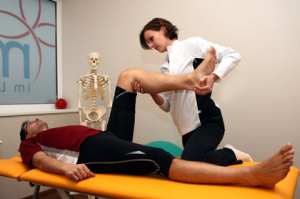

MedFriendly®


Rehabilitation
Rehabilitation (often abbreviated as rehab) is the
restoration of normal (or near-normal) functioning after
a disease, illness, injury, imprisonment, or addiction.
Examples of rehabilitation after an illness would be
teaching someone muscle stretching exercise and
endurance training techniques due to muscular
deconditioning resulting from being bedridden when
suffering from a serious disease such as cancer.
FEATURED BOOK: Essentials of Rehabilitation
Physical therapy of the leg.
An example of physical rehabilitation after an injury would be treatment with a physical
therapist to improve strength in a body part (e.g., pelvis, shoulder, leg) after treatment for
a bone break. There can also be rehabilitation of thinking skills after an injury, which is
commonly referred to as “cognitive rehabilitation.” An example would be teaching
someone techniques to improve memory and concentration abilities after a traumatic
brain injury.
Rehabilitation after imprisonment is sometimes referred to as behavioral rehabilitation.
The goal is to enforce strict standards of behavior with significant consequences for
violating these standards to improve the behavioral functioning of the individual. Another
form of rehabilitation is the rehabilitation of addictions. Examples include rehabilitation for
drug abuse, alcohol abuse, gambling, food addictions, etc.
"Where Medical Information is Easy to Understand"™
Whether one is need of behavioral rehabilitation
or a disease or drug related rehabilitation, this is a
form of help that should be sought as soon as
possible. There is no reason to wait until the last
minute, especially when there are a number of
cases in which postponing treatment can be fatal.
Some rehab centers that can assist with a
plethora of different ailments. There are varying
levels of care that can be provided, so there is no
excuse not to at least speak with a specialist.
Rehabilitation comes from the Latin word
“rehabilitare” meaning “to make fit.”
















